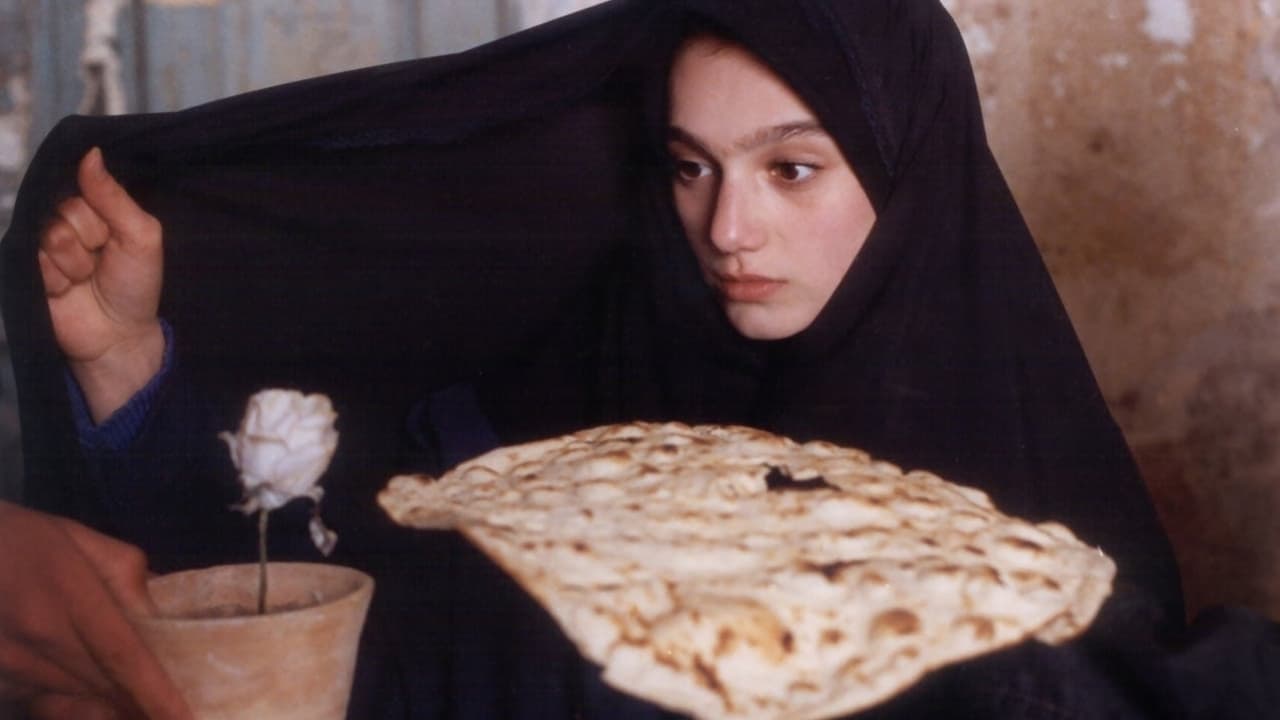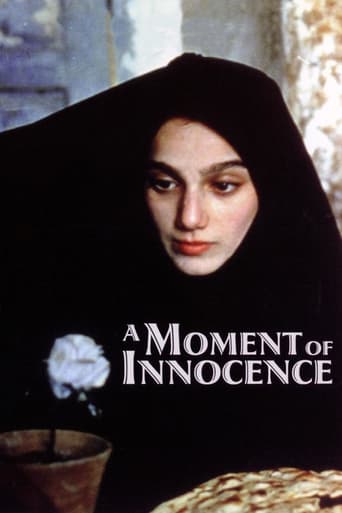

Did you people see the same film I saw?
... View MoreThe tone of this movie is interesting -- the stakes are both dramatic and high, but it's balanced with a lot of fun, tongue and cheek dialogue.
... View MoreBy the time the dramatic fireworks start popping off, each one feels earned.
... View MoreThere is, somehow, an interesting story here, as well as some good acting. There are also some good scenes
... View MoreA Moment of Innocence, or The Bread and the Flower Pot, closely recalls fellow Iranian director Abbas Kiarostami's Close-Up, which also sough to recapture real life with its own dramatic conviction. In his own retelling of the story of a politically charged attempt to disarm and take a policeman's gun in his youth, Mohsen Makhmalbaf has created something so unique and so layered that it at first baffles the mind. Makhmalbaf wields the camera with an intent to retell faithfully and truthfully, in true Cinéma vérité style - his stylistic choices represent a documentary that cannot tell lies, and yet it becomes increasingly unreliable. In once scene, he converses with the young actor who will play him in the car in long take, talking about everything from future ambitions to romantic crushes, and it puts on a mask of genuineness. They approach his cousin's household to ask if her daughter will play a part in the film. As the girl goes to serve tea to the young actor, she suddenly whispers to him as if he has Mohsen himself, and they are planning the events that will lead to the fateful stabbing. It has suddenly becomes a moment of artifice without any stylistic or directorial indication. Another technique that Makhmalbaf plays with is one that Kiarostami also used in his 1999 film, The Wind Will Carry Us. While the camera films in wide shot and the characters walk further and further away, the sound levels do not adjust accordingly and realistically, but remain in our ears, as if they were right here next to us. Such a technique throws our objectivity up into the air; surely this must have been dubbed later? And near the end of the film Makhmalbaf will slowly add a musical soundtrack to dramatise the climatic encounter, and replace the still long takes with more dynamic follow shots and closeups. One thing that remains abundantly clear however is the amateur nature of the young actors.This tension is what makes the film tick. You see, both Makhmalbaf and the policeman seem to have entirely different accounts of what happened 20 years ago, and slowly they begin to realise this as they are in the process of recapturing those events. The policeman wants a tall, handsome young actor to portray him, and sulks when he does not get his way. He vigorously coaches the kid on how to properly play himself, and freely interrupts the filming process to criticise and adjust (and Makhmalbaf also freely layers perspectives of the camera onto each other). And yet, the artifice does shine through. Twice, the policeman storms off, the second after that tumultuous discovery that the 20 years of longing for the girl had been all for nothing, a lie to keep him awake. Makhmalbaf does not attempt to document these emotions in closeup, yet he is also eager to use the soundtrack to imitate the reaction. And he does not relent when he has the actors right in front of him; the policeman feigning suicidal thoughts after the discovery, and the young Mohsen breaking into tears and refusing to commit the violence of the past.This becomes the key to that breathtaking final freeze frame. Makhmalbaf seeks to recreate the truth, but has become aware of the impossibility of filming an objective, unbiased version of the past. That politically charged activist youth is no more, and the post-revolution mindset becomes clear in the young actor's ideals of saving mankind, but not through violence. And in the young policeman, who does not want to wield the gun to shoot, even if both are just artificial constructs. So they instead offer the bread and the flower pot, a symbolic blossoming of the new generation, and a testament to the ability of film to be able to reconcile and transform the reality of these weary old men.
... View MoreIt is true that from a purely technical perspective, the freeze frame at the end of this film is quite revolutionary. A lot of viewers have expressed some positive comments about it. Hence, it would not be an understatement to call it one of the best moments in the history of cinema. However, Iranian director Mohsen Makhmalbaf goes much more beyond this accomplishment as 'A moment of innocence' attempts to recreate an important event of the past in present times for future generations using existential themes and film making process. As a young man, while protesting against Shah's regime, director Mohsen Makhmalbaf had stabbed a police man. Although he chose an autobiographical episode which occurred many years ago, there has been no attempt made by Makhmalbaf to glorify neither violence nor revolutionary ideology. It appears as if everybody has become more compassionate including the young actor chosen to represent Makhmalbaf. This pacifist strategy brings everybody connected to the film to the conclusion that violence is no solution if the world needs to be changed. It is only through love can somebody aspire to change the world.
... View MoreAt the age of seventeen, Mohsen Makhmalbaf stabbed a police officer in an act of misguided political defiance. He spent the next few years in prison for this crime before beginning a successful career as a film director in the 1980s. According to this film, which may or may not be based on fact, the policeman he had stabbed showed up at a casting call some twenty years after their violent encounter with hopes of becoming an actor and impressing a girl that he had failed to woo due to his injury.Makhmalbaf sees the policeman's appearance as a unique chance to recreate his past and shed light on his own motivations so he decides to create a film about the incident with the policeman training an actor to understand how the event affected him while Makhmalbaf himself trains an actor to understand his motivations. The film is de-politicized, an unfortunate necessity in a country which still imprisons its artists at the slightest sign of anti-establishment leanings. Still, Makhmalbaf neatly sidesteps this by casting an idealist who wants to save the world as his teenage self.While the young Makhmalbaf was completely focused on changing society to be better for everyone, the young policeman was interested only in his own personal life, particularly in beginning a relationship with a girl he thought was flirting with him. There's a subtle point being made here about the banality of evil as the policeman, a representative of a group activists such as young Makhmalbaf found oppressive, never expresses any interest in the ideological aspect of his job. Thus the knife attack, which can hardly be seen as an effective means of protest even if the policeman had been a hardcore fascist, becomes an absurdly meaningless act. This is illustrated in the recreation of the attack in that the actor is hiding the knife under a piece of bread—he's using a symbol of nourishment only as a means of concealing a symbol of hatred. At the same time, the policeman in the recreation is holding a flower he has bought to express his attraction to the girl. In order to protect his gun, he has to drop the flower. Thus, the act of violence is not only hurting him physically, it's also causing him to lose his chance for happiness with the girl.A Moment of Innocence is a thought provoking film which uses Iranian cinema's usual focus on meta-narratives in an unusual way. It's also a well made film which strikes just the right tone for the subject matter. Mohsen Makmalbaf is a director I plan to become much more familiar with.
... View MoreWhen the director Mohsen Makhmalbaf was 17 he stabbed a policeman, now that policeman has come to him to ask for an acting job. The work begins to reconstruct the actual incident and they both work on picking their younger selves. However the actors who are to play them are almost identical in their personality.In many ways it's comparable to the style of Jean-Luc Godard. It sets up absurd situations and plays with reality, even within the films own reality. The film is indeed an odd mix. It's basically about it's own creation. And some parts, as the actual incident happened in real life. Though many elements are played for laughs and could be classified as a comedy it separates from Godard in one major point. Instead of having sarcasm under it's surface we will her find humanity and suffering.In full it's a look at Irans culture and the old and the new generations view of violence and what it takes to be good. It's artistic style helps to enhance not only the absurdity but also the isolation that can be found in this society. A film about progress and memories that is sure to evoke emotions.
... View More